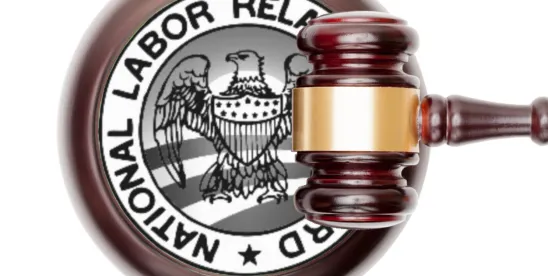On July 24, 2025, William B. Cowen, the Acting General Counsel of the National Labor Relations Board (“NLRB” or “Board”), issued GC Memorandum 25-08 to the Board’s 26 regional offices providing guidance on determining if an employment applicant in the salting context is protected by the National Labor Relations Act (“NLRA” or the “Act”). While not binding law, GC Memorandum 25-08 indicates a policy priority for the agency’s line prosecutors in union salt cases.
Background
The NLRB defines “salting” as “the act of a trade union in sending a union member or members to an unorganized jobsite to obtain employment and then organize the employees.” Toering Electric Co., 351 NLRB 225, 225 fn. 3 (2007) (citations omitted).
Salts have conditional protection under the NLRA as prospective “employees” – meaning, employers cannot typically refuse to hire or to consider to hire salt applicants, unless the salt applicant engages in conduct with the intent to provoke employers not to hire them or indicate a desire not to be hired. The public policy is to balance a union’s right to organize with an employer’s concern that the Board’s salting rules could “be too easily used for the private partisan purpose of inflicting substantial economic injury on targeted nonunion employers.”
Acting NLRB GC Guidance on Salting Cases
According to the Acting NLRB GC, here’s the framework for analysis as to whether an employer violated the Act by refusing to hire (or considering to hire) a salt applicant:
- The NLRB GC must initially prove, based on the preponderance of the evidence (i.e., more likely than not), that (1) an employer was hiring or had concrete plans to hire; (2) an applicant had relevant experience or training; an employer did not uniformly require such experience or training; or those requirements were pretextual; and (3) union animus was part of why a salting applicant was not hired.
- The NLRB GC must also initially show that the salt applicant was genuinely interested in seeking employment from the employer.
- If the NLRB GC makes this showing, then an employer may challenge the genuineness of a salt’s application, including with the following evidence:
- applicant’s refusal of similar employment;
- belligerent or offensive comments on a salt’s application;
- disruptive, insulting, or antagonistic conduct by a salt applicant; or
- stale or incomplete applications.
- The NLRB GC – who has the ultimate burden of proof – then may rebut an employer’s challenge with evidence of the genuineness of a salt’s application.
The Acting GC emphasized that the investigating Regions must “no longer conclusively presume that an applicant is entitled to protection as a statutory employee” and that “neither will we presume, in the absence of contrary evidence, that an application for employment is anything other than what it purports to be.”
The Acting GC also instructed the Regions to focus their initial investigations on obtaining evidence from the charging party – typically, the individual and/or the unions – before requesting employer documents or testimony. Specifically, evidence regarding whether the application was submitted or authorized, and if the salt had a genuine interest in being hired.
If no such evidence exists, then the unfair labor practice charge should be dismissed, and the investigation should end without seeking evidence from the employer.
Takeaways
- Review hiring practices. Audit hiring protocols and keep meticulous records to ensure that a nondiscriminatory rationale for refusing to hire or consider an applicant can be provided.
- Scrutinize employment applications. Flag and document potentially problematic language in employment applications that may indicate an applicant is not genuinely interested in the position (e.g., applicants listing “filing charges” as a hobby or skill).
- Prior union experience is not disqualifying. Applicants do not automatically lose NLRA protection because they worked for a unionized employer or held a union position. On the contrary, refusing to hire an applicant solely based on prior union affiliation could be the basis for an unfair labor practice. However, such experience along with other factors may indicate a lack of genuineness of a salt’s application.
- Applicant misconduct outside the salting context remains unprotected. Employers may still refuse to hire or consider hiring applicants who submit fraudulent, incorrect, or misleading resumes that omit unfavorable information without violating the NLRA.
We will monitor whether this new agency guidance manifests into any significant cases before the NLRB.




 />i
/>i

